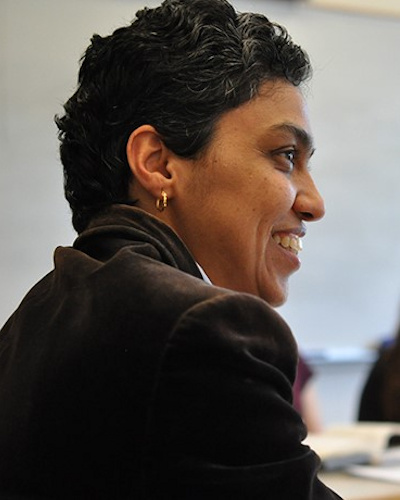
Dr. Sahar Shafqat
Biography
Sahar Shafqat (she/they) was born and raised in Karachi, Pakistan to a loving family. She grew up having a relatively privileged childhood - both in class and in religion. Grateful for the support from her parents, Sahar and her three siblings were able to attend university in the United States. While in Pakistan, she first became aware of her sexuality from a young age. Attending university in the United States helped her to find language and a framework for both her sexuality and her politics. Even though she was able to be more open about her sexuality in the United States, she still experienced a feeling of otherness, even if not explicitly known. It was through unpacking this feeling of otherness and reflecting on feeling marginalized, that allowed Sahar to not only think deeply about her experience as a queer individual, but also become critical of other factors in her life such as class, capitalism, and neocolonialism. Initially entering Mount Holyoke College with a plan to study economics, Sahar ended up taking multiple political science classes on the side for her own interest. It was through these classes and their own personal reflection that Sahar realized their deep love and passion for political science. Realizing that she could turn this love into a tangible career, she went on to pursue a graduate degree in political science at Texas A&M.
During her time in undergrad as well as graduate school, there were not many queer Muslim role models for Sahar to look up to. This led Sahar to begin connecting with a community of South Asian queer organizers while at Texas A&M. In addition to meeting people in person, they also connected with queer people nationally and globally through the Internet. It was through conversations and the connections they were making that led them to realize a deep need for spaces for queer people to connect with one another.
Following 9/11 Sahar shifted their focus to specifically work on queer organizing for the Muslim community. After 9/11, Sahar realized that she didn’t explicitly identify as Muslim before the September 11 attacks. Growing up in a Muslim-majority country meant that she never had to explicitly identify herself as Muslim. However, the experiences of the Muslim-American community drastically changed following 9/11 and Sahar was able to feel the full weight of what it meant to be Muslim. She recognized that Muslims had special concerns and unique lived experiences that required attention. After participating in conversations with other queer Muslim leaders, Sahar helped form the Muslim Alliance for Sexual and Gender Diversity (MASGD). Holding a yearly retreat, MASGD’s main goal was and continues to be to center and serve the queer and trans Muslim community, and address the intersection of homophobia and transphobia with Islamaphobia. MASGD recognizes that being both queer and Muslim means experiencing homophobia and transphobia in a majority of Muslim communities, and experiencing Islamaphobia in LGBTQ+ communities. This intersection creates a challenge for queer Muslims that is really large and complex. In the initial conversations of what MASGD could realistically achieve with the minimal funding and resources they had, Sahar and her colleagues realized that a majority of their resources had to focus on their community. With the nature of intersectionality, they recognized that it would be very easy to get pulled in a million different directions, but MASGD decided to and still remains centered around supporting the queer Muslim community as its central aim. Sahar recently stepped down from her position at MASGD in order to build up a new cohort of leaders, who are still focused on and continuing the goal she set out when she founded the organization. In addition to MASGD, Sahar has also been a part of KhushDC, a South Asian LGBTQ+ organization located in Washington, D.C. KhushDC offers similar support and community for queer South Asians.
Currently, Sahar is a professor of political science at St. Mary’s College of Maryland where she focuses on social and political movements, ethnic conflict and nationalism, and gender and sexuality studies. In addition to this, they have written a book entitled “Pakistan’s Political Parties: Surviving between Dictatorship and Democracy.” Aside from teaching and writing, she is also working on addressing and challenging homophobia and transphobia in mainstream Muslim spaces. Sahar’s realization that there are practically no safe Muslims spaces for queer people to enter has led her to begin working towards creating these safe spaces. They have been reaching out to Muslim community leaders and participating in conversations to encourage a more open environment for queer Muslims, mostly non-religious community leaders. At the same time, Sahar is assembling a team of scholars to provide a much needed affirming interpretation of religious texts so that eventually she will be able to continue to have these conversations with religious leaders as well.
(This biographical profile drafted by Becks Loo from an interview with Sahar Shafqat and edited by Sahar.).
Biography Date:
Tags
Islam (Progressive) | Activist (religious institutions) | Racism | Asian American | Muslim Alliance for Sexual & Gender Diversity | Pakistan | Washington, D.C.
Citation
“Dr. Sahar Shafqat | Profile”, LGBTQ Religious Archives Network, accessed February 14, 2026, https://lgbtqreligiousarchives.org/profiles/sahar-shafqat.
Remembrances